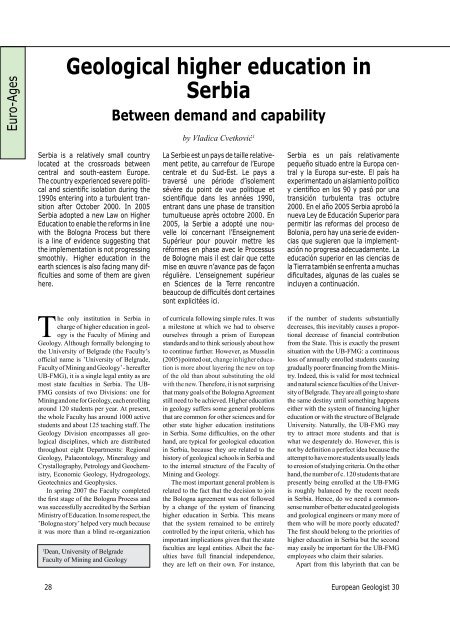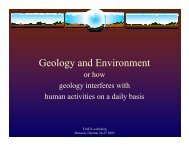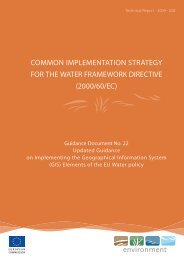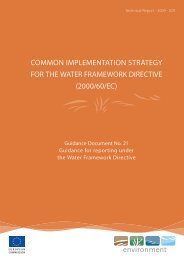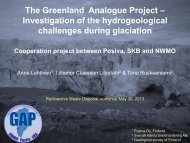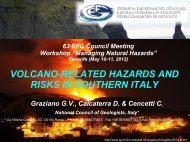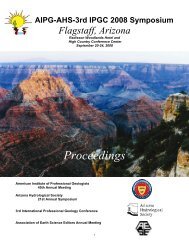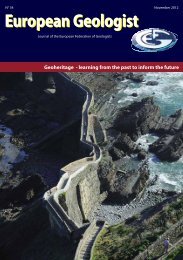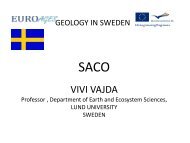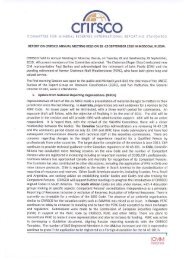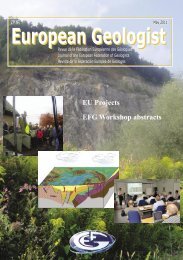EGM 30 download.pdf - European Federation of Geologists
EGM 30 download.pdf - European Federation of Geologists
EGM 30 download.pdf - European Federation of Geologists
Create successful ePaper yourself
Turn your PDF publications into a flip-book with our unique Google optimized e-Paper software.
Euro-AgesGeological higher education inSerbiaBetween demand and capabilityby Vladica Cvetković 1Serbia is a relatively small countrylocated at the crossroads betweencentral and south-eastern Europe.The country experienced severe politicaland scientific isolation during the1990s entering into a turbulent transitionafter October 2000. In 2005Serbia adopted a new Law on HigherEducation to enable the reforms in linewith the Bologna Process but thereis a line <strong>of</strong> evidence suggesting thatthe implementation is not progressingsmoothly. Higher education in theearth sciences is also facing many difficultiesand some <strong>of</strong> them are givenhere.The only institution in Serbia incharge <strong>of</strong> higher education in geologyis the Faculty <strong>of</strong> Mining andGeology. Although formally belonging tothe University <strong>of</strong> Belgrade (the Faculty’s<strong>of</strong>ficial name is ’University <strong>of</strong> Belgrade,Faculty <strong>of</strong> Mining and Geology’ - hereafterUB-FMG), it is a single legal entity as aremost state faculties in Serbia. The UB-FMG consists <strong>of</strong> two Divisions: one forMining and one for Geology, each enrollingaround 120 students per year. At present,the whole Faculty has around 1000 activestudents and about 125 teaching staff. TheGeology Division encompasses all geologicaldisciplines, which are distributedthroughout eight Departments: RegionalGeology, Palaeontology, Mineralogy andCrystallography, Petrology and Geochemistry,Economic Geology, Hydrogeology,Geotechnics and Geophysics.In spring 2007 the Faculty completedthe first stage <strong>of</strong> the Bologna Process andwas successfully accredited by the SerbianMinistry <strong>of</strong> Education. In some respect, the’Bologna story’ helped very much becauseit was more than a blind re-organization1Dean, University <strong>of</strong> BelgradeFaculty <strong>of</strong> Mining and GeologyLa Serbie est un pays de taille relativementpetite, au carrefour de l’Europecentrale et du Sud-Est. Le pays atraversé une période d’isolementsévère du point de vue politique etscientifique dans les années 1990,entrant dans une phase de transitiontumultueuse après octobre 2000. En2005, la Serbie a adopté une nouvelleloi concernant l’EnseignementSupérieur pour pouvoir mettre lesréformes en phase avec le Processusde Bologne mais il est clair que cettemise en œuvre n’avance pas de façonrégulière. L’enseignement supérieuren Sciences de la Terre rencontrebeaucoup de difficultés dont certainessont explicitées ici.<strong>of</strong> curricula following simple rules. It wasa milestone at which we had to observeourselves through a prism <strong>of</strong> <strong>European</strong>standards and to think seriously about howto continue further. However, as Musselin(2005) pointed out, change in higher educationis more about layering the new on top<strong>of</strong> the old than about substituting the oldwith the new. Therefore, it is not surprisingthat many goals <strong>of</strong> the Bologna Agreementstill need to be achieved. Higher educationin geology suffers some general problemsthat are common for other sciences and forother state higher education institutionsin Serbia. Some difficulties, on the otherhand, are typical for geological educationin Serbia, because they are related to thehistory <strong>of</strong> geological schools in Serbia andto the internal structure <strong>of</strong> the Faculty <strong>of</strong>Mining and Geology.The most important general problem isrelated to the fact that the decision to jointhe Bologna agreement was not followedby a change <strong>of</strong> the system <strong>of</strong> financinghigher education in Serbia. This meansthat the system remained to be entirelycontrolled by the input criteria, which hasimportant implications given that the statefaculties are legal entities. Albeit the facultieshave full financial independence,they are left on their own. For instance,Serbia es un país relativamentepequeño situado entre la Europa centraly la Europa sur-este. El país haexperimentado un aislamiento políticoy científico en los 90 y pasó por unatransición turbulenta tras octubre2000. En el año 2005 Serbia aprobó lanueva Ley de Educación Superior parapermitir las reformas del proceso deBolonia, pero hay una serie de evidenciasque sugieren que la implementaciónno progresa adecuadamente. Laeducación superior en las ciencias dela Tierra también se enfrenta a muchasdificultades, algunas de las cuales seincluyen a continuación.if the number <strong>of</strong> students substantiallydecreases, this inevitably causes a proportionaldecrease <strong>of</strong> financial contributionfrom the State. This is exactly the presentsituation with the UB-FMG: a continuousloss <strong>of</strong> annually enrolled students causinggradually poorer financing from the Ministry.Indeed, this is valid for most technicaland natural science faculties <strong>of</strong> the University<strong>of</strong> Belgrade. They are all going to sharethe same destiny until something happenseither with the system <strong>of</strong> financing highereducation or with the structure <strong>of</strong> BelgradeUniversity. Naturally, the UB-FMG maytry to attract more students and that iswhat we desperately do. However, this isnot by definition a perfect idea because theattempt to have more students usually leadsto erosion <strong>of</strong> studying criteria. On the otherhand, the number <strong>of</strong> c. 120 students that arepresently being enrolled at the UB-FMGis roughly balanced by the recent needsin Serbia. Hence, do we need a commonsensenumber <strong>of</strong> better educated geologistsand geological engineers or many more <strong>of</strong>them who will be more poorly educated?The first should belong to the priorities <strong>of</strong>higher education in Serbia but the secondmay easily be important for the UB-FMGemployees who claim their salaries.Apart from this labyrinth that can be28 <strong>European</strong> Geologist <strong>30</strong>


